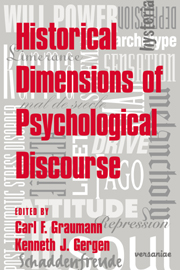Book contents
- Frontmatter
- Contents
- List of contributors
- 1 Psychological discourse in historical context: An introduction
- Part I Disciplining psychological discourse
- Part II History as culture critique
- Part III Early antecedents
- 9 The naturalized female intellect
- 10 Sources of redemption in psychoanalytic developmental psychology
- 11 The historical vicissitudes of mental diseases: Their character and treatment
- 12 Women as mothers and the making of the European mind
- Part IV Lived history
- Author index
- Subject index
12 - Women as mothers and the making of the European mind
Published online by Cambridge University Press: 20 October 2009
- Frontmatter
- Contents
- List of contributors
- 1 Psychological discourse in historical context: An introduction
- Part I Disciplining psychological discourse
- Part II History as culture critique
- Part III Early antecedents
- 9 The naturalized female intellect
- 10 Sources of redemption in psychoanalytic developmental psychology
- 11 The historical vicissitudes of mental diseases: Their character and treatment
- 12 Women as mothers and the making of the European mind
- Part IV Lived history
- Author index
- Subject index
Summary
Bildung is a human right.
– Graffiti, Psychologisches Institut, Freie Universität BerlinTo Hanus and Mechthild Papousek
Over the past quarter century the topic of the “woman as mother” has achieved a recognizable if somewhat isolated place in sociohistorical research (Welter, 1966; Bloch, 1978; Badinter, 1980; Treckel, 1989; Todd, 1980; Nash, 1981; Wilson, 1984; Dixon, 1988; Lewis, 1989; Atkinson, 1991). Separate from this history, another topic of research has been able to establish itself: the “history of childhood” (van den Berg, 1956; Ariès, 1960; DeMause, 1974; Peeters, 1975; Arnold, 1980; Borstelmann, 1983; Schlumbohm, 1983; Boswell, 1988; Shahar, 1990). Parallel to these concerns there has developed a further branch of research that aims to pursue historically the relationships between parents and children (Hunt, 1970; Demos, 1970; DeMause, 1974; Greven, 1977; Kagan, 1977; Ozment, 1983; Pollock, 1983; Houlbrooke, 1984; Ottmüller, 1991).
In reviewing literature in these areas it is noticeable that there is a lack of reciprocal permeation. The history of the woman as mother has left virtually no mark on the history of the parent–child relationship, in which a distinction is seldom made between father and mother (Crawford, 1986), and which fails to give even the slightest of hints that a history of the woman as mother might prove a sensible object of research. On the other hand, in studies of the woman as mother, points of contact with the history of childhood are scarcely detectable.
- Type
- Chapter
- Information
- Historical Dimensions of Psychological Discourse , pp. 227 - 240Publisher: Cambridge University PressPrint publication year: 1996
- 1
- Cited by

